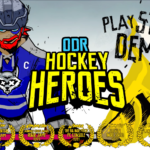At a Glance:
- According to Made In Ca, the video game industry contributed $5.5 billion to Canada’s GDP in 2021 and 61% of Canadians play video games.
- Game development happens in rural areas as well, there’s no need to move to an urban centre to make games.
- By showing young learners they can build careers in the tech and gaming industries, and giving them the skills to do so, Pinnguaq hopes to see a more diverse sector.
As rural communities such as Kawartha Lakes continue to be known for their quiet charm and small town feel, youth are learning through opportunities at Pinnguaq that these regions are also home to budding tech industry leaders and game developers.
On Dec. 16, a group of 16 teens filled Pinnguaq’s Lindsay Makerspace to meet a local game developer, learn about the process of building a video game and even help in the development process.
Cheers and chants echoed through the Makerspace as attendees of the ODR Hockey Heroes playtest tried their hands at the arcade hockey video game developed by Treewood Studio. Whether they were tipping the puck into the back of the net or dropping gloves in a spirited bout of fisticuffs, there was no shortage of excitement in the space. Moreover, the participants were contributing to a game being built here, in their community, through playtesting (playing the game and actively searching for bugs or opportunities for improvement).
“My favourite part of the event was seeing how excited the learners were when they helped find a bug in the game. They were pretty excited to just be playing, but I could feel how delighted they were to be participating in the development process in such a fun way,” said Kaya Truax, Kawartha Lakes Makerspace Lead for Pinnguaq.
Chris Atallah, who splits his time between Kawartha Lakes and Toronto, is developing the game as a celebration of hockey, particularly the outdoor rink-style version of the game many Canadians grow up playing and loving. Atallah even made sure to inject his own experience of shoveling snow off the lake and playing shinny into the game itself.
A relatable experience for those who, like Atallah, grew up playing on outdoor rinks, the adrenaline-pumping pick-up-and-play hockey video game will have players scoring goals and laying hits like a true legend in no time.
Atallah says players can expect some environmental storytelling, as their characters go from playing hockey in rural and remote areas to playing in the city as their hockey careers develop.
“As you play, more and more people come to watch. It’s all about progression,” he says, noting the whole point was to create a game anyone could pick up and enjoy, including his earliest playtesters: his wife and parents.
“When my mom scored a goal on a pass from my dad I was pretty happy about it,” adds Atallah.
Atallah first connected with Pinnguaq at a conference where he met Ryan Oliver, Pinnguaq’s CEO, who was excited about the opportunity to embrace the Mentorship component of Pinnguaq’s Lifecycle by connecting young learners with the up-and-coming developer.
“It’s been so great to connect with Chris about ODR Hockey Heroes and for him to be willing to bring his game to the Makerspace for Kawartha Lakes youth to playtest, it’s so generous,” says Ryan Oliver, CEO of Pinnguaq. “For these participants to be able to meet a game developer from their own community, it lets them know that where they live shouldn’t be a barrier to what they can do with their digital skills. They can use all the STEAM knowledge they’re building now to pursue their dreams, just like Chris has with Treewood Studios and ODR Hockey Heroes.”
“The biggest benefit for the kids, in my opinion, is that this kind of experience gives them the opportunity to see that people from their area, who have a similar background, can be game developers,” says Truax. “It allows them to imagine themselves as not just players of video games but also as potential young developers themselves. Opening kids’ minds to this idea is like opening a door to so many new possibilities. They begin to think,’why can’t I do that?’”
As Atallah proves, the geographic area someone lives in shouldn’t deter budding developers from creating games wherever they are.
“There’s no need to be in the city. You can make games anywhere, all you need is an internet connection,” he explains, adding that while he works with many local artists, everything is being done remotely.
According to Made In Ca, the video game industry contributed $5.5 billion to Canada’s GDP in 2021 and 61% of Canadians play video games. Furthermore, the number of video game companies in Canada increased by 35% between 2019 and 2021.By showing young learners they can build careers in the tech and gaming industries, and giving them the skills to do so in rural, remote and Indigenous communities, Pinnguaq hopes to see a more diverse sector, stacked with talent from across Canada.
To learn more about ODR Hockey Heroes, follow them on Instagram, X (Twitter), Youtube, or Facebook. Wishlist the game now and play the free demo of the game on Steam!
